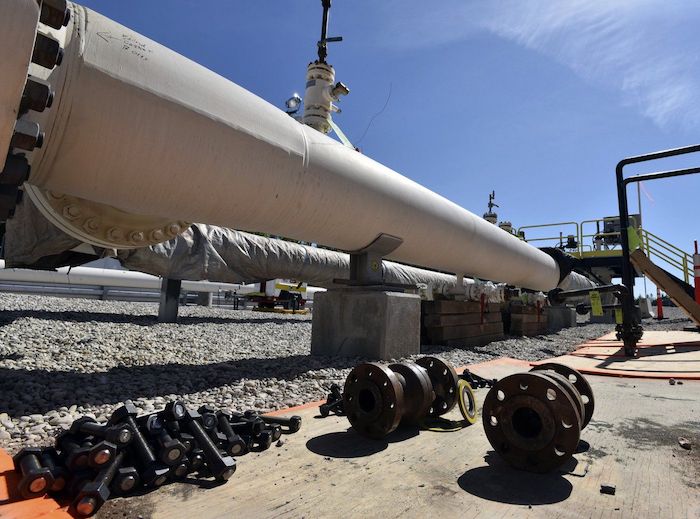Economy
Indigenous band could have been more help, says judge in Wisconsin Line 5 dispute

Fresh nuts, bolts and fittings are ready to be added to the east leg of the pipeline near St. Ignace as Enbridge prepares to test the east and west sides of the Line 5 pipeline under the Straits of Mackinac in Mackinaw City, Mich. on June 8, 2017. North America’s existential debate about the virtues and dangers of oil and gas pipelines faces a critical test today in Wisconsin. THE CANADIAN PRESS/AP, Detroit News, Dale G Young
By James McCarten in Washington
The Indigenous band in Wisconsin that’s trying to shut down the Line 5 pipeline got a chilly reception Thursday from a federal court judge who is dismayed they aren’t doing more to help Enbridge Inc. avoid an ecological disaster.
The Bad River Band of the Lake Superior Chippewa has asked district court Judge William Conley to order the pipeline shut down, fearing that heavy flooding last month could cause the line to spring a leak on their territory.
But from the outset of Thursday’s hearing, it was clear Conley — who ordered the two sides to work together last fall on finding a solution to their impasse — doesn’t believe the band is holding up its end of the bargain.
“The band has not helped itself by refusing to take any steps to prevent a catastrophic failure,” Conley said as the hearing got underway. “You haven’t even allowed simple steps that would have prevented some of this erosion.”
The day-long hearing ended without a decision on the band’s request for an injunction — and with the clear sense Conley is disinclined to grant one. “It’s an extraordinary request to make when the band is doing nothing,” he said.
But band lawyer Riyaz Kanji said he was pleased during an otherwise discouraging day that the judge gave indications he would establish a threshold for erosion damage that would trigger a shutdown.
“Unfortunately, from our point of view, he didn’t set that today — he’s not shutting it down,” Kanji said. “But we will remain hopeful that he will set a standard that will protect the river and its precious resources.”
Conley, who has already ruled that the band was entitled back in 2013 to revoke permission for the pipeline, was also unwilling to grant the injunction on the grounds that Enbridge no longer has the right to access the area.
“The harder thing to hear was that the judge appears unwilling … to issue an injunction because of Enbridge’s continuing trespass on the band’s lands,” Kanji said.
“It sounds like he’s thinking more in terms of financial penalties.”
In court documents, Enbridge has accused the band of being focused on a single outcome: the permanent closure of the pipeline on their territory “while refusing much less extreme alternative measures.”
The band argues that several weeks of flooding along the Bad River last month has washed away so much of the riverbank and supporting terrain that a breach is “imminent” and a shutdown order more than justified.
Enbridge insists the dangers are being overstated — and even if they were real, the company’s court-ordered contingency plan, which spells out the steps it would take, would be a far more rational solution.
“Enbridge will pre-emptively purge and shut down the line well in advance of any potential rupture,” the company says in its court brief, adding that the area remains under constant 24-hour video surveillance.
“Any flooding and erosion has not, and would not, catch Enbridge by surprise.”
But Enbridge has been rebuffed in its efforts to perform remedial work on the site, which would include using sandbacks and trees to fortify the riverbanks — a decision band chairman Mike Wiggins defended Thursday.
The band has the right under federal law to enforce its own water quality standards, which were “developed by careful evaluation of our relationships, as a people, with different parts of our hydrology in the Bad River watershed,” Wiggins told a news conference after the hearing.
“What was kind of put forward today was, ‘None of that stuff should matter. None of that stuff should exist. When Enbridge came knocking, you should have just let them do whatever they want,'” he said.
“We disagree.”
Heavy flooding that began in early April washed away significant portions of the riverbank where Line 5 intersects the Bad River, a meandering, 120-kilometre course that feeds Lake Superior and a complex network of ecologically delicate wetlands.
The band has been in court with Enbridge since 2019 in an effort to compel the pipeline’s owner and operator to reroute Line 5 around its traditional territory — something the company has already agreed to do.
But the flooding has turned a theoretical risk into a very real one, the band argues, and time is now of the essence. Lawyers for the band and its supporters were scheduled to hold a news conference after the hearing.
Line 5 meets the river just past a location the court has come to know as the “meander,” where the riverbed snakes back and forth multiple times, separated from itself only by several metres of forest and the pipeline itself.
At four locations, the river was less than 4.6 metres from the pipeline — just 3.4 metres in one particular spot — and the erosion has only continued.
The neighbouring state of Michigan, led by Attorney General Dana Nessel, has been waging its own war against Line 5, fearing a leak in the Straits of Mackinac, the ecologically delicate waterway where the pipeline crosses the Great Lakes.
“The alarming erosion at the Bad River meander poses an imminent threat of irreparable harm to Lake Superior which far outweighs the risk of impacts associated with a shutdown of the Line 5 pipeline,” Nessel argues in her brief.
“Without judicial intervention, it is likely that this irreparable harm will be inflicted not only on the band, but also on Michigan, its residents, and its natural resources.”
The economic arguments against shutting down the pipeline, which carries 540,000 barrels of oil and natural gas liquids daily across Wisconsin and Michigan to refineries in Sarnia, Ont., are by now well-known.
Line 5’s defenders, which include the federal government, say a shutdown would cause major economic disruption across the Prairies and the U.S. Midwest, where it provides feedstock to refineries in Michigan, Ohio and Pennsylvania.
It also supplies key refining facilities in Ontario and Quebec, and is vital to the production of jet fuel for major airports on both sides of the Canada-U.S. border, including Detroit Metropolitan and Pearson International in Toronto.
A lengthy statement issued Tuesday by the Canadian Embassy warned of severe economic consequences of shutting down the line, as well as the potential ramifications for bilateral relations.
“The energy security of both Canada and the United States would be directly impacted by a Line 5 closure,” the statement said. Some 33,000 U.S. jobs and US$20 billion in economic activity would be at stake, it added.
“At a time of heightened concern over energy security and supply, including during the energy transition, maintaining and protecting existing infrastructure should be a top priority.”
Talks have been ongoing for months under the terms of a 1977 pipelines treaty between the two countries that effectively prohibits either country from unilaterally closing off the flow of hydrocarbons.
This report by The Canadian Press was first published May 18, 2023.
— With files from The Associated Press
Daily Caller
UN Chief Rages Against Dying Of Climate Alarm Light


From the Daily Caller News Foundation
The light of the global climate alarm movement has faded throughout 2025, as even narrative-pushing luminaries like Bill Gates have begun admitting. But that doesn’t mean the bitter clingers to the net-zero by 2050 dogma will go away quietly. No one serves more ably as the poster child of this resistance to reality than U.N. chief Antonio Guterres, who is preparing to host the UN’s annual climate conference, COP30, in Brazil on Nov. 10.
In a speech on Monday, Guterres echoed poet Dylan Thomas’s advice to aging men and women in his famed poem, “Do not go gentle into that good night:”
Do not go gentle into that good night,
Old age should burn and rave at close of day;
Rage, rage against the dying of the light.
Dear Readers:
As a nonprofit, we are dependent on the generosity of our readers.
Please consider making a small donation of any amount here.
Thank you!
Though wise men at their end know dark is right,
Because their words had forked no lightning they
Do not go gentle into that good night.
Seeing that his own words have “forked no lightning,” Guterres raged, raged against the dying of the climate alarm light.
“Governments must arrive at the upcoming COP30 meeting in Brazil with concrete plans to slash their own emissions over the next decade while also delivering climate justice to those on the front lines of a crisis they did little to cause,” Guterres demanded, adding, “Just look at Jamaica.”
Yes, because, as everyone must assuredly know, the Earth has never produced major hurricanes in the past, so it must be the all-powerful climate change bogeyman that produced this major storm at the end of an unusually slow Atlantic hurricane season.
Actually, Guterres’ order to all national governments to arrive in Belem, Brazil outfitted with aspirational plans to meet the net-zero illusion, which everyone knows can and will never be met, helps explain why President Donald Trump will not be sending an official U.S. delegation. Trump has repeatedly made clear – most recently during his September speech before the U.N. General Assembly – that he views the entire climate change agenda as a huge scam. Why waste taxpayer money in pursuit of a fantasy when he’s had so much success pursuing a more productive agenda via direct negotiations with national leaders around the world?
“The Green New Scam would have killed America if President Trump had not been elected to implement his commonsense energy agenda…focused on utilizing the liquid gold under our feet to strengthen our grid stability and drive down costs for American families and businesses,” Taylor Rogers, a White House spokeswoman, said in a statement to the Guardian. “President Trump will not jeopardize our country’s economic and national security to pursue vague climate goals that are killing other countries,” she added.
The Guardian claims that Rogers’s use of the word “scam” refers to the Green New Deal policies pursued by Joe Biden. But that’s only part of it: The President views the entire net-zero project as a global scam designed to support a variety of wealth redistribution schemes and give momentum to the increasingly authoritarian forms of government we currently see cracking down in formerly free democracies like the U.K., Canada, Germany, France, Australia and other western developed nations.
Trump’s focused efforts on reversing vast swaths of Biden’s destructive agenda is undoing 16 years of command-and-control regulatory schemes implemented by the federal government. The resulting elimination of Inflation Reduction Act subsidies is already slowing the growth of the electric vehicles industry and impacting the rise of wind and solar generation as well.
But the impacts are international, too, as developing nations across the world shift direction to be able to do business with the world’s most powerful economy and developed nations in Europe and elsewhere grudgingly strive to remain competitive. Gates provided a clear wake-up call highlighting this global trend with his sudden departure from climate alarmist orthodoxy and its dogmatic narratives with his shift in rhetoric and planned investments laid out in last week’s long blog post.
Guterres, as the titular leader of the climate movement’s center of globalist messaging, sees his perch under assault and responded with a rhetorical effort to reassert his authority. We can expect the secretary general to keep raging as his influence wanes and he is replaced by someone whose own words might fork some lightning.
David Blackmon is an energy writer and consultant based in Texas. He spent 40 years in the oil and gas business, where he specialized in public policy and communications.
Business
The Liberal budget is a massive FAILURE: Former Liberal Cabinet Member Dan McTeague

Prime Minister Mark Carney tabled his government’s long-overdue budget yesterday and took the same approach as his predecessor – spend, spend, spend.
Canada’s deficit is now a staggering $78 BILLION. To make matters worse, Carney doubled down on the industrial carbon tax.
Dan McTeague explains in his latest video.
-

 Economy2 days ago
Economy2 days agoWelcome to the Energy Humanist Club! Bill Gates breaks the moral monopoly against fossil fuels
-

 Business2 days ago
Business2 days agoNo Jobs Clause: Liberals Under Fire Over Stellantis Deal in Fiery Committee Showdown
-

 Agriculture2 days ago
Agriculture2 days agoDanish Cows Collapsing Under Mandatory Methane-Reducing Additive
-

 Business2 days ago
Business2 days agoFederal budget: Carney government posts largest deficit in Canadian history outside pandemic
-

 Business2 days ago
Business2 days agoBudget 2025 continues to balloon spending and debt
-

 Censorship Industrial Complex1 day ago
Censorship Industrial Complex1 day agoHow the UK and Canada Are Leading the West’s Descent into Digital Authoritarianism
-

 Business1 day ago
Business1 day agoCapital Flight Signals No Confidence In Carney’s Agenda
-

 Economy2 days ago
Economy2 days agoThe True Cost of Mark Carney’s Ineffective Green Energy Sinkhole











